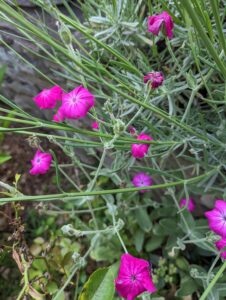 Back in the 1930’s, British writer Margery Allingham introduced a new amateur sleuth to the world of whodunits. His name was Albert Campion, a gentleman detective in the mold of Dorothy Sayers’ Lord Peter Wimsey. Pundits differ on how Allingham arrived at Campion’s name, but there are references in the books to rose campion or Lychnis coronaria, a southern European Wildflower that has been cultivated in Europe since the 1600’s. Rose campion is handsome, sprightly, and resilient, just like its namesake literary character, so I like to think there is a connection.
Back in the 1930’s, British writer Margery Allingham introduced a new amateur sleuth to the world of whodunits. His name was Albert Campion, a gentleman detective in the mold of Dorothy Sayers’ Lord Peter Wimsey. Pundits differ on how Allingham arrived at Campion’s name, but there are references in the books to rose campion or Lychnis coronaria, a southern European Wildflower that has been cultivated in Europe since the 1600’s. Rose campion is handsome, sprightly, and resilient, just like its namesake literary character, so I like to think there is a connection.
Just as Albert Campion tended to pop up unexpectedly in the middle of criminal mayhem, rose campion popped up unexpectedly in my garden. I am quite sure that I never bought it or planted it, but I have seen it elsewhere in the neighborhood. I suspect that responsibility lies with birds or bees, those great gardeners who make a habit of distributing seeds far and wide.Rose campion is a perennial or biennial member of the carnation or Caryophyllaceae family that tends to self-seed readily and forms happy clumps in soils ranging from very good to reasonably poor. The plants grow between two and three feet tall, with a spread of about half that. The leaves are a soft, silvery gray-green and invite touching, growing opposite each other on lanky stems that branch off, sprouting eye-catching flowers. Those one-inch blooms may be red, white, or pink, but that does not really describe the color of the most common rose campion plants. The best color description is bright fuchsia, and even that only hints at the flowers’ visual impact.
Like all long-cultivated plants, rose campion has acquired a host of nicknames, including rabbits’ ears, crown pink, and mullein pink. “Rabbits ears” may be a reference to the soft, fuzzy leaves. The plants often leap the garden fence and grow wherever they go, populating some of the same field edges as true mulleins, inviting that nickname. “Crown” relates back to the Latin species name, “coronaria,” which means “crown” or garland. Anything as pretty as rose campion invites inclusion in summer flower crowns. Rose campion is blooming now—very late spring and early summer in my garden—and fills empty space vacated by the browned-out foliage of spring-blooming plants like daffodils and tulips. They combine nicely with the blue salvias and lavenders that are appearing simultaneously and require little care.
Anything cultivated for over four hundred years has survived through repeated cycles of popularity. Right now, with the vogue for pollinator plants, “rewilding” gardens and more causal landscaping styles, rose campion is due for a renaissance. A few days ago, I turned on a morning chat show and saw rose campion popping out of plantings at Rockefeller Center in New York, so that renaissance may have started already.
Lychnis coronaria has mostly avoided the attention of breeders. White and red forms are sometimes available, with ’Alba’, being a common example of the former. Once cultivar, ‘Blych,’ sold under the trade name “Gardeners World,” boasts double-petaled flowers that are bigger and redder than those of the species. The blooms are also sterile, ending worries about rampant self-seeding. If you are in the market for something that looks a little daring while remaining well-mannered, “Gardener’s World” –named for a venerable British gardening show-may be right for you.
If you don’t like self-seeding plants and/or double flowers, you can also thwart the biological imperative by deadheading your traditional rose campion when the flowers fade. I like self-seeders because they save work and reinforce garden serendipity. If little rose campions pop up in awkward places, I simply relocate them, a process that takes very little time and effort.
Like rose campion, deer appear frequently in my yard. Unlike rose campion, they are distinguished by vacant expressions and voracious appetites. Fortunately, the deer tend to ignore the plants, which makes them doubly valuable.
If your garden includes sunny or very lightly shaded spaces and you have a yen for something that pops in early summer, be on the lookout for rose campion at the larger and better garden centers in your area. Online vendors carry various varieties, but most are sold out right now. If you can wait until fall, try White Flower Farm, P.O. Box 50, Litchfield, CT 06759; (800) 503-9624; www.whiteflowerfarm.com. Print catalog available.
